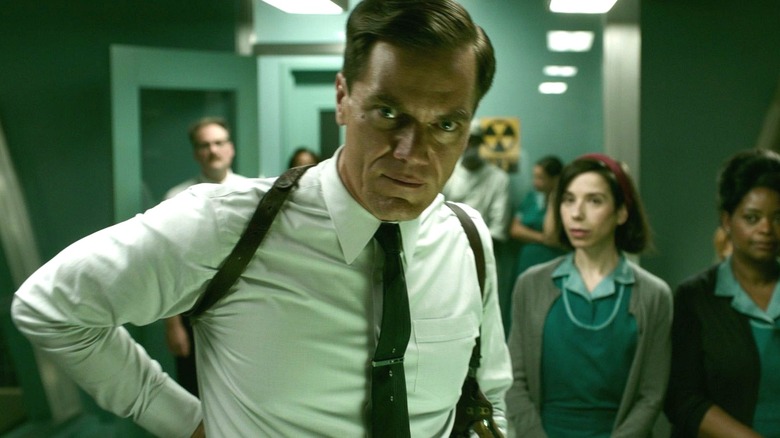
No matter how talented his castmates are, Michael Shannon easily stands out from the crowd onscreen. The actor's 6'3" frame easily makes him look imposing, and his stoic facial expressions are an unmissable signature that permeates every role he plays. However, behind that tough-looking countenance lies an often underrated talent and an impressive range.
Whereas many actors shine brightly in over-the-top parts, Shannon's true strength lies in subtlety. Over the course of his career, he has played everything from hardened criminals to iconic rock stars, but all of his characters have one thing in common: a compelling duality that plays out in small moments. By fully committing to roles, Shannon captures unconscious behaviors that make his portrayals feel real. He makes it possible to see how many characters would like others to see them and how they truly see themselves.
Whether he is the leading man or merely a side character, Shannon reliably delivers memorable performances in both television and movies. He is the type of actor that audiences should observe closely to appreciate his talent, and the effort is worth every minute. In his best roles, he commands attention in an understated manner, making it impossible to look away.
Mud
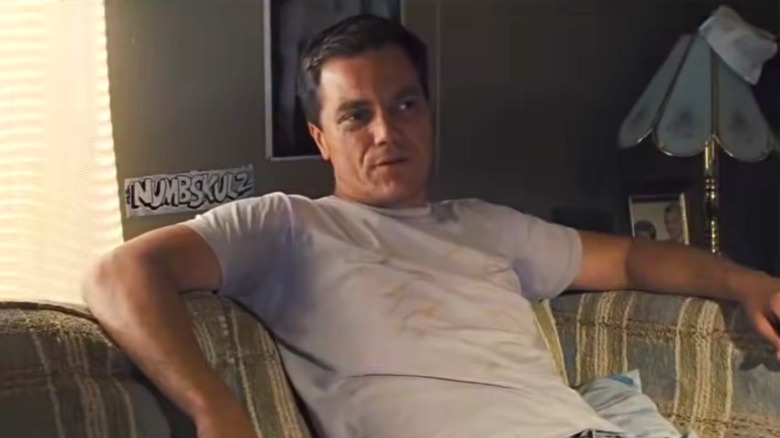
Michael Shannon's role in "Mud," Jeff Nichols' coming-of-age drama about two teens who help a murderer (Matthew McConaughey) escape his victim's family, is small, but he is still one of the unsung heroes of this film. Uncle Galen feels like a man with a colorful past, and it's a shame that the story doesn't have enough space to explore it. Galen's guitar playing and small homages to punk rock in his home give audiences the sense that he probably had a very different life planned for himself. However, he nevertheless seems content in his role as a surrogate father to his nephew, Neckbone (Jacob Lofland). Although not as fully formed as some of Shannon's better parts, Galen is the type of person Shannon excels at embodying: a voice of reason who has earned wisdom the hard way.
Whereas many of Shannon's characters are forceful in their convictions, Galen takes a gentler approach to guide his nephew. He warns Neckbone about the potential dangers of the situation in which he and Ellis (Tye Sheridan) have involved themselves but doesn't assert authority. He never forces Neckbone to open up but makes himself abundantly available. Being a safe space for Neckbone makes Galen a great character, but, unfortunately, it also makes him more forgettable than he deserves to be.
Nine Perfect Strangers
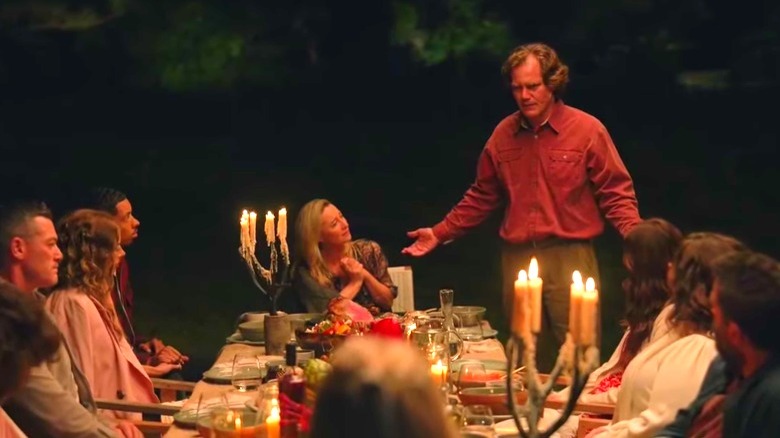
The miniseries "Nine Perfect Strangers," which follows the guests at a mysterious resort in California, combines Shannon's talent for playing characters with complicated backstories with his humorous side. Napoleon Marconi has some of the most memorable lines in the show, thanks to Shannon's knack for delivering monologues with the perfect amount of gravitas. The grieving father divides himself between cringy dad jokes and meaningful soliloquies while desperately reaching for closure after his son's suicide. In addition, the apparent emotional rift between Napoleon and his wife and daughter makes him seem alone despite being surrounded by people.
However, as sympathetic as this character is, he is more one-note than some of Shannon's stronger roles. Anyone would feel guilt and regret in Napoleon's situation, but there are times when he feels a little too long-suffering and spends excessive energy on self-blame. Interestingly, this aspect allows audiences to understand why there is such a disconnect in the Marconi family. He gradually becomes more resilient, but it's not as easy to root for Napoleon's journey as it could be.
If you or anyone you know is having suicidal thoughts, please call the National Suicide Prevention Lifeline by dialing 988 or by calling 1-800-273-TALK (8255).
Jesus' Son
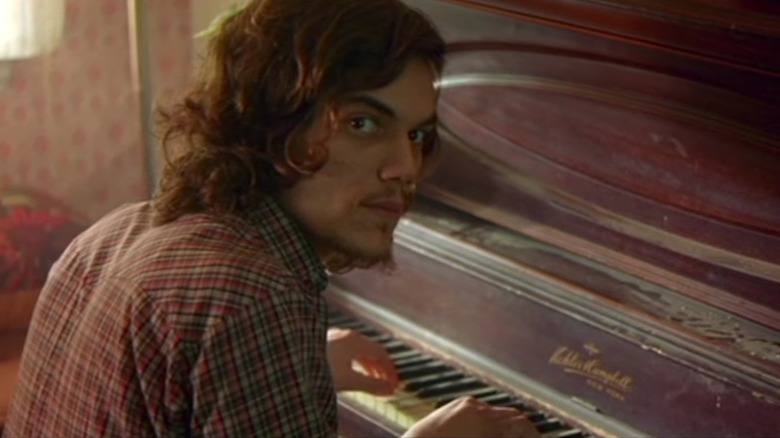
Based on the short story collection of the same name, "Jesus' Son" focuses on narrator F.H. (Billy Crudup), who reflects on his traumatic life and drug addiction. As he wanders through his early adulthood, he meets various equally wayward characters, including a gruff man named Dundun. Michael Shannon took on this role at 25, so it gives modern-day viewers a fun look at his early work in dramatic films. Dundun may seem unlikable initially, but there is something strangely endearing about him that even FH can't deny. From his nonchalant assertion that he has shot McInnes (John Ventimiglia) to his offhand complaint about the death ruining his birthday, Dundun is the comic relief of his vignette. Shannon's dry delivery generates plenty of laughs, and even how he carries himself lends refreshing humor to trigger-happy Dundun.
Furthermore, Shannon's body language reveals the character's hidden uneasiness, alerting audiences that his tough-guy demeanor is an act. The young man's purest moments occur in front of an old piano, where he looks more at peace than anywhere else. Fittingly, Dundun's final scene shows him toying with a melody as if the day's events had never happened. Dundun is noteworthy because of how much characterization Shannon captures in his short time on screen, but the role isn't as significant as the actor's more recent projects.
If you or anyone you know needs help with addiction issues, help is available. Visit the Substance Abuse and Mental Health Services Administration website or contact SAMHSA's National Helpline at 1-800-662-HELP (4357).
Before The Devil Knows You're Dead
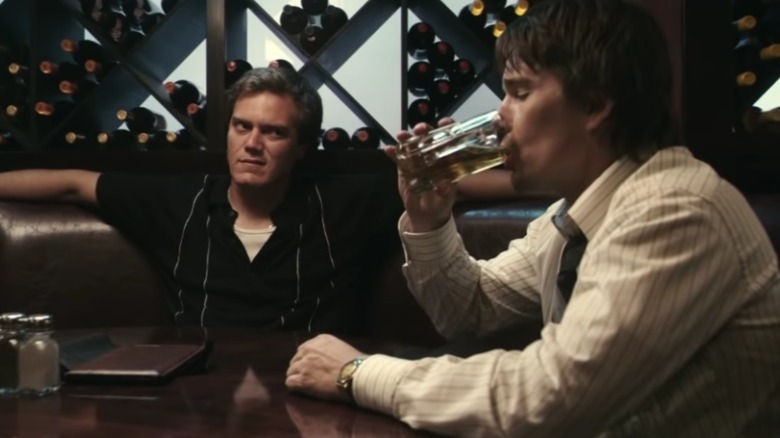
Side characters aren't always memorable, but Shannon's credits include multiple minor parts worthy of praise. One of his more notable villainous roles is Dex, who appears in a handful of scenes in "Before The Devil Knows You're Dead," Sidney Lumet's critically acclaimed crime drama about two brothers planning a heist on their own parents' jewelry store. Dex is a man nobody could want as an enemy because Shannon makes him terrifying without raising his voice or resorting to violence. Instead, Dex is menacing subtly, playing to Shannon's strengths as an actor who thrives in nuance.
For example, instead of simply relying on threats, Dex asserts his dominance by giving Hank (Ethan Hawke) and Andy (Philip Seymour Hoffman) silly nicknames when they come to deliver money. He clearly enjoys making people squirm and excels at eliciting that reaction. However, his lack of emotional range keeps Dex from being a more successful character. He is protective of his sister, but audiences don't see enough of that side to genuinely care about him. His death is easily the least impactful demise of any Michael Shannon character because he doesn't have a particularly satisfying arc. Still, it's hard to argue with the power of his presence and his importance in sealing Andy's fate.
The Iceman
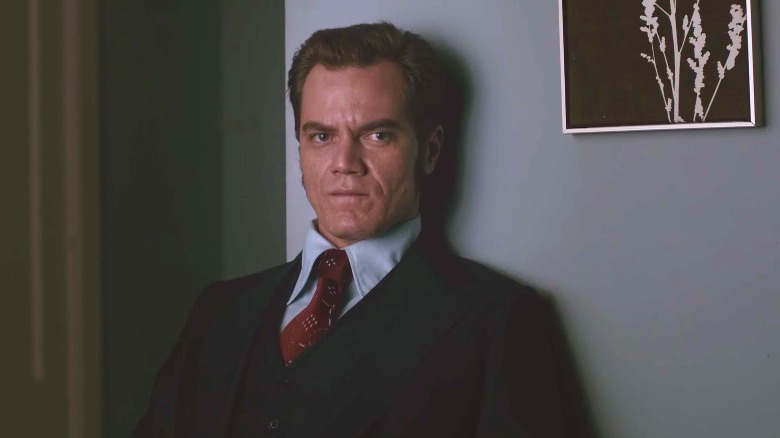
Although Michael Shannon often plays upstanding citizens, the 2012 biopic "The Iceman" allows him to show off his acting range on the other side of the law. Hitman Richard Kuklinski is an easy fit for Shannon because of his complicated personality. Kuklinski lives a double life as a hired gun and a husband, keeping his wife in the dark about his murderous tendencies. The most successful part of the actor's performance in this film is its believability. The real-life Kuklinski admitted to committing over 100 murders, and it's easy to see Shannon's rendition of him being just as ruthless.
However, for all of the intensity Shannon's Kuklinski brings to the table, this character isn't as intriguing as audiences might expect a vicious killer to be. Shannon expertly embodies Kuklinski's dark side, but despite his nickname, this role could have benefitted from more emotional range in some sections. For example, the violent scenes have incredible can't-look-away tension, but most of the sequences depicting his personal life fall flat by comparison. Shannon gives an enviably consistent performance throughout, but there's not enough redemptive value to Kuklinski's story to rival his most riveting roles.
Waco
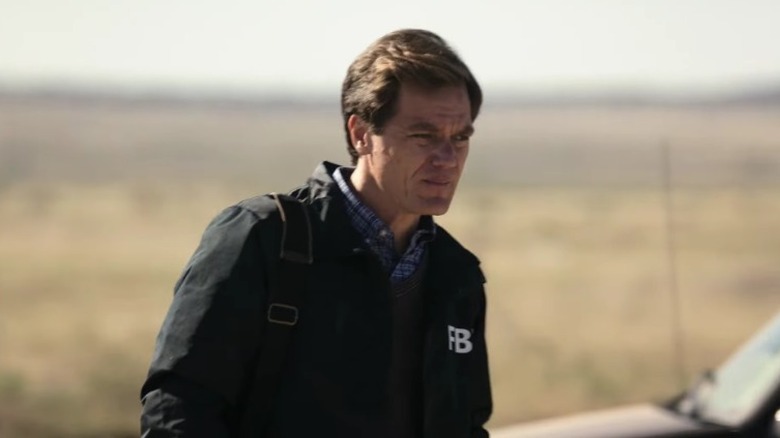
Michael Shannon is no stranger to playing dramatized versions of actual people, and the miniseries "Waco" is an excellent example of his talent with this type of role. The show chronicles a lengthy standoff between the FBI, ATF, and the Branch Davidians, which came to a tragic conclusion. It explores both sides of the conflict, offering a compelling examination of the event. In "Waco," Shannon portrays hostage negotiator Gary Noesner and describes working closely with the real-life Noesner in an interview with Salon. According to Shannon, the agent refers to him as his "doppelganger." The two have a positive working relationship. He also highlights the negotiation tactics he has learned from Noesner and relates them to the instincts that successful actors need to embody their roles fully.
Gary Noesner is similar to characters audiences have seen Shannon play before. He's a straight-laced lawman with a clear sense of how things should be done, even if his colleagues don't always agree. While trying to negotiate a peaceful surrender from the Branch Davidians, Noesner grapples with morality. His sense that law enforcement's aggressive approach to the situation is flawed lends a welcome complexity to his personal story. Ultimately, however, Noesner functions as a compassionate everyman, giving audiences a window into the humanity of a challenging situation. Although he's a highlight of the series, his universality makes him less powerful than Shannon's more dynamic roles.
Knives Out
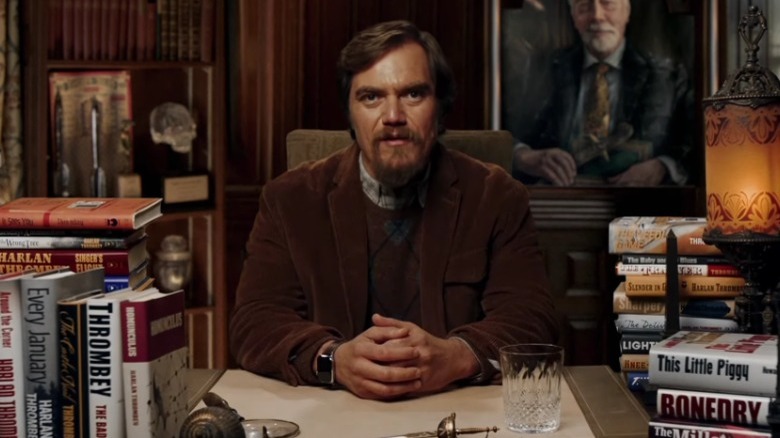
Michael Shannon typically stars in serious roles, but "Knives Out," Rian Johnson's satirical and vaguely meta whodunnit, allowed audiences to see the actor's fun side. Regarding dysfunctional families, the Thrombeys are downright hilarious. At the heart of this pack of stereotypical "entitled trust fund brats" is youngest sibling Walt Thrombey, CEO of the family's publishing company. Despite his lofty professional title, Walt is very immature and delusional about his talents as a CEO. Of course, Shannon gives Walt the insufferable air of superiority audiences would expect from a man who considers himself heir-apparent of a family dynasty.
Walt's inflated sense of self is cringe-worthy and a little sad, but Shannon never misses a comedic beat. His delivery perfectly matches Walt's frequent sarcasm and snide comments, especially when arguing with his siblings. Shannon also succeeds at making Walt socially awkward and insecure through subtle inconsistencies in his behavior. His actions and body language don't always match his harsh words and stuck-up attitude. These inconsistencies make him a more sympathetic character -- or, at least, as sympathetic as a greedy, backstabbing Thrombey can be. Walt isn't among Shannon's most multifaceted roles, but the actor successfully gives this spoiled caricature a small dose of dimension.
99 Homes
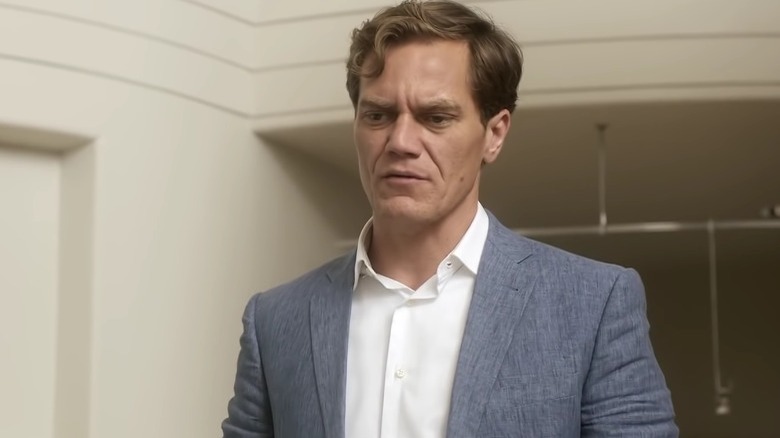
Although "99 Homes" delivers an important message about the human tragedies of the mid-aughts housing crisis, the intensity Shannon brings to his role as real estate broker Rick Carver is the best aspect of this film. Carver initially seems like a ruthless, one-dimensional antagonist, but Shannon shows an impressive understanding of this deeply flawed character and ultimately plays him as a sympathetic figure. Audiences soon learn that despite arguably ruining lives in his line of work, Carver is the product of circumstances much more significant than himself.
Shannon delivers some incredibly well-cadenced monologues, giving Carver an unapologetic rawness that adds relatability to this otherwise villainous character. Carver is ruthless and unwilling to change his behavior, but he is also highly self-aware, which keeps him from being satirical. Despite how in control Carver appears to be, Shannon adds an understated sense of weariness to some of Carver's quieter scenes. Unlike many of his smaller parts, Carver puts Shannon center stage and shows audiences just how well the actor fits in a leading role. However, because Carver is also a vehicle for the film's larger message, he doesn't always feel as balanced as Shannon's most memorable characters.
Elvis & Nixon
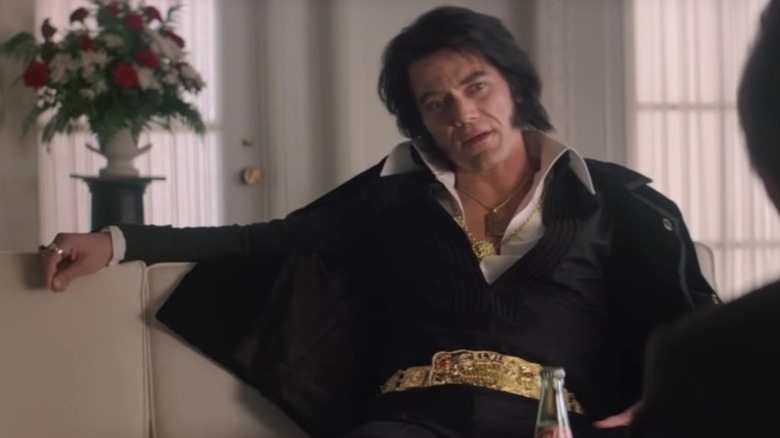
Given Shannon's propensity for taking on subdued characters, the idea of him playing a rockstar like Elvis Presley may seem strange to some fans. However, he takes a novel approach to bringing Elvis to life in "Elvis & Nixon," director Liza Johnson's dramatization of Elivs' famous 1970 meeting with President Richard Nixon. In a Billboard interview, Shannon explains that he worked alongside Presley's real-life childhood friend, Jerry Schilling, and discovered something crucial about The King: "I think he wanted to be respected more than anything." That insight shines through in Shannon's uniquely down-to-earth portrayal of this often misunderstood icon.
True, he looks a little out of place in The King's flashy wardrobe, but Shannon approaches the part with a lowkey swagger that makes him convincing. Shannon is also surprisingly funny in this movie, especially when Elvis ignores all the dos and don'ts the White House staff establishes for his meeting with Nixon (Kevin Spacey). Shannon imbues this role with the self-confidence audiences would expect from a mega-star, but doesn't resort to any over-the-top antics. Whereas a more flamboyant rendition of Presley would probably look ridiculous propositioning the President of the United States for an undercover position in federal law enforcement, Shannon's version allows the entertainer a moment to be taken seriously.
Boardwalk Empire
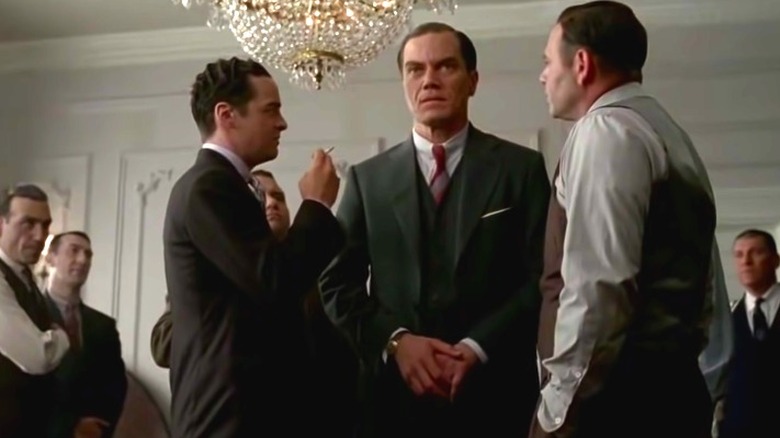
"Boardwalk Empire" is an acclaimed period crime drama that transports audiences back to the Prohibition era with great detail and performances. Bureau of Prohibition agent Nelson Van Alden is among the best examples of Shannon's unflinching portrayals of government officials. Even with a gun to his head (literally), Van Alden never lets his enemies see signs of fear or weakness. However, his power masks deep, complex pain, which shines through in Shannon's performance. Although he isn't as ostentatious as other criminals in the series, Van Alden is among the most dynamic. He lives a double life in ways both personal and professional, and his struggles with morality are palpable in every scene. Shannon's incredible control reflects precisely how a man like Van Alden would have to behave to survive the Atlantic City underworld.
Van Alden's best scene is his last one: a fateful meeting with mob boss Al Capone (Stephen Graham) in the final season. The ever-restrained official finally snaps, slapping the gangster and attacking him. As incredibly as Shannon embodies the calm, collected side of Van Alden's personality, this show of explosive anger is equally believable. His death is startlingly abrupt, but also somehow fitting. After grappling with his hidden identity and constant self-betrayal, it makes sense that Van Alden's final words reflect his true self.
Revolutionary Road
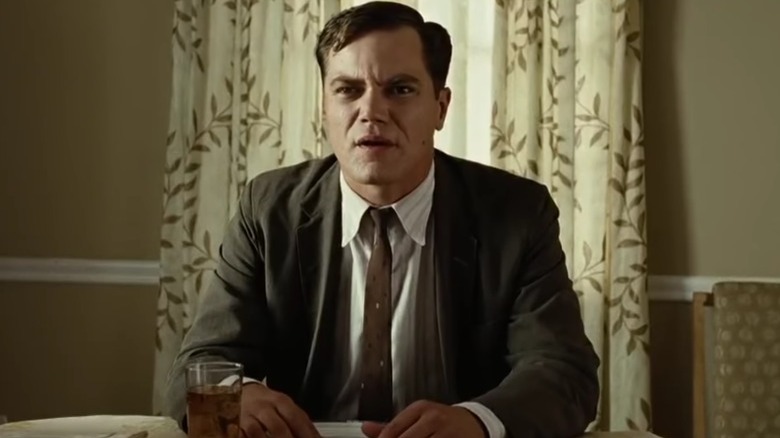
John Givings may not get as much screen time as some characters in "Revolutionary Road," Sam Mendes' romantic drama about a married couple whose relationship is deteriorating. But Michael Shannon's delivery ensures this former math teacher is undeniably memorable. Although other characters may not like what Givings has to say, he relays the brutal truth with eloquence at every turn. As with many of Shannon's best characters, Givings has a multifaceted personality and isn't easily understood by those around him. The actor does an excellent job of making Givings look erratic, and everyone is happy to label him mentally ill.
However, Givings serves an essential purpose that makes him a fantastic supporting character. He is the only one who seems able to make sense of April and Frank Wheeler's (Kate Winslet and Leonardo DiCaprio) initial plans to move to Paris. As a person on the fringe of society, Givings is uniquely equipped to understand the need to escape a life based on fulfilling expectations instead of finding happiness. Shannon steals every scene that he's in, demanding to be heard by both the Wheelers and the audience. Givings naturally doesn't go through a major arc as a side character, which keeps him from being Shannon's best-ever role.
George & Tammy
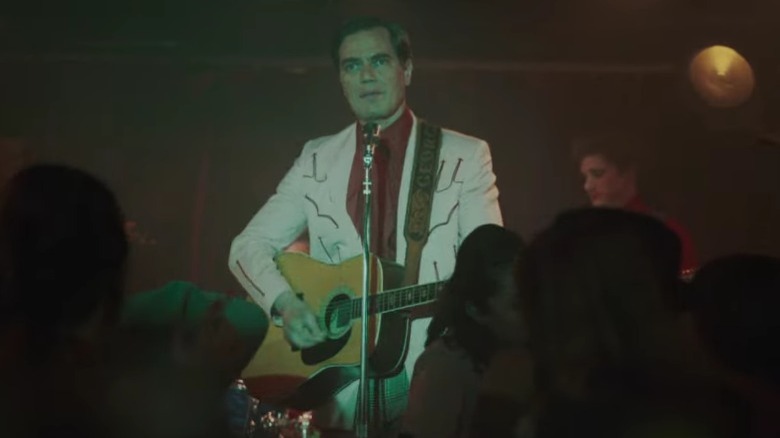
Michael Shannon proved his worth in biopics before "George & Tammy" aired, but his performance as country music star George Jones demonstrates just how well he can take on a real-life persona. The most impressive thing about this role is that Shannon incorporates his musical talents, which sets "George & Tammy" apart from his other acting projects. In a KTLA 5 interview, costar Jessica Chastain explains that she contacted Shannon about the show because of his love for playing guitar and singing. Both skills are displayed throughout the miniseries, giving viewers access to a side of Shannon rarely seen in television or movies.
His humble nature and genuine love for Tammy truly make George Jones one of Shannon's best roles. Shannon often plays self-assured, formidable characters, so seeing him in a softer light is refreshing. Of course, the on-screen chemistry between Shannon and Chastain is a major highlight in the series, and the two actors match each other beat for beat throughout. The small cast and close focus also ensure Shannon gets the screen time he deserves. However, as great as Shannon's performance is, it's hard not to miss a little bit of his signature intensity in this role.
The Shape Of Water
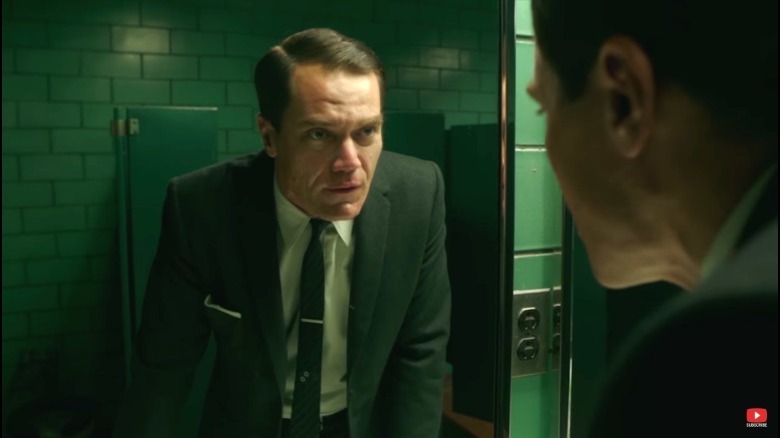
As "The Shape Of Water," Guillermo del Toro's Oscar-winning drama about a lonely woman who finds love with a fish-man, plays with the definition of a monster, Michael Shannon expertly captures that side of Colonel Richard Strickland's nature. The actor is truly in his element as Strickland, a government agent hell-bent on completing his objectives by any means necessary. His sense of what is right is clearly flawed, but his deep belief in his purpose makes him one of Shannon's most intriguing roles. For example, the actor's natural ability to resemble a walking powderkeg makes Strickland's ongoing frustration palpable, even when it's simmering beneath the surface.
There's nothing to empathize with in Strickland's personality, and that's part of what makes him such an incredibly memorable character. Shannon never holds back on making the agent menacing and aggressive, but what stops him from being unrealistically evil are some subtle touches in his performance. He gives this character a thin sliver of humanity in small moments, even in the face of his intense arrogance and superiority complex. Strickland is a man under extreme pressure, and watching him grapple with a fervent desire to meet expectations is enthralling no matter how many times one rewatches this movie.
Nocturnal Animals
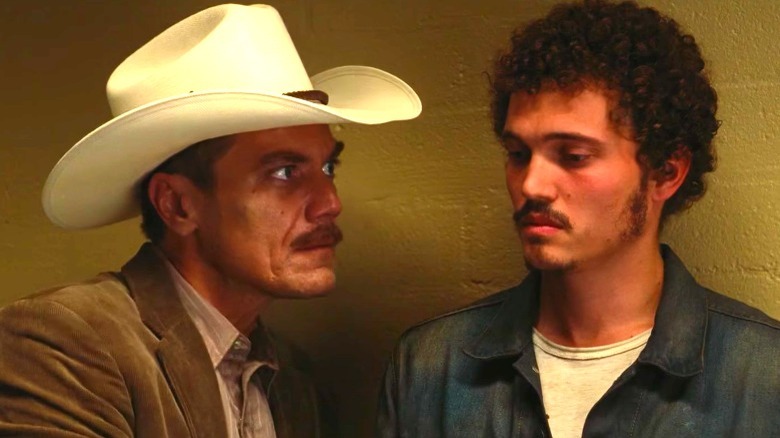
Michael Shannon earned an Oscar nomination for his turn in "Nocturnal Animals," a psychological thriller about a woman who becomes obsessed with her ex-husband's new novel, noticing how it parallels her own life. Shannon plays detective Bobby Andes, and when it comes to the actor's most noteworthy characters, he's in a class of his own. From his unblinking stare to his intimidating behavior, Bobby represents one of the best utilizations of Shannon's acting skills to date. The actor's performance is intense and deliberate through each gritty moment, invoking a combination of fear and understanding from viewers. Thanks to Shannon's intentionality, audiences can feel the depth of the detective's backstory before even knowing the details. The actor's facial expressions are spot-on, and he effortlessly encapsulates the world-weariness beneath Bobby's stern exterior.
Bobby represents the sheer power of vengeance and its impact on people, changing their character and causing them to behave in ways they never could have expected. Yet, ultimately, Bobby is also a redemptive character in his own way. Isolated and terminally ill, he treats helping Tony Hastings (Jake Gyllenhaal) find justice as his last good deed. Of course, in Bobby's case, the road to righteousness is paved with violence, but it's a thoroughly captivating journey every step of the way. Bobby is not only the most enigmatic character Shannon has ever played, but he's also the most unforgettable.
Read this next: The 14 Best Film Acting Debuts Of All Time
The post 14 Best Michael Shannon movies and TV shows, ranked appeared first on /Film.
Did you find this article inspiring? Let us know by pinning us!
